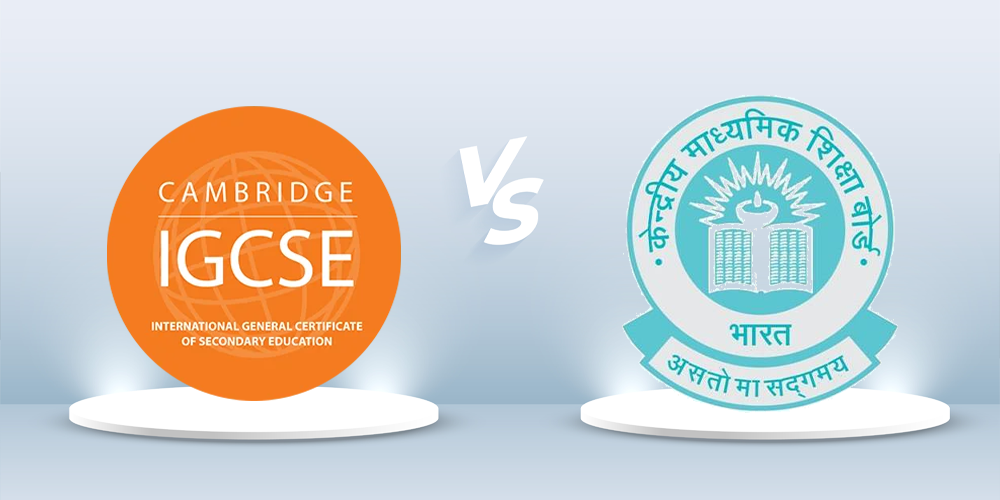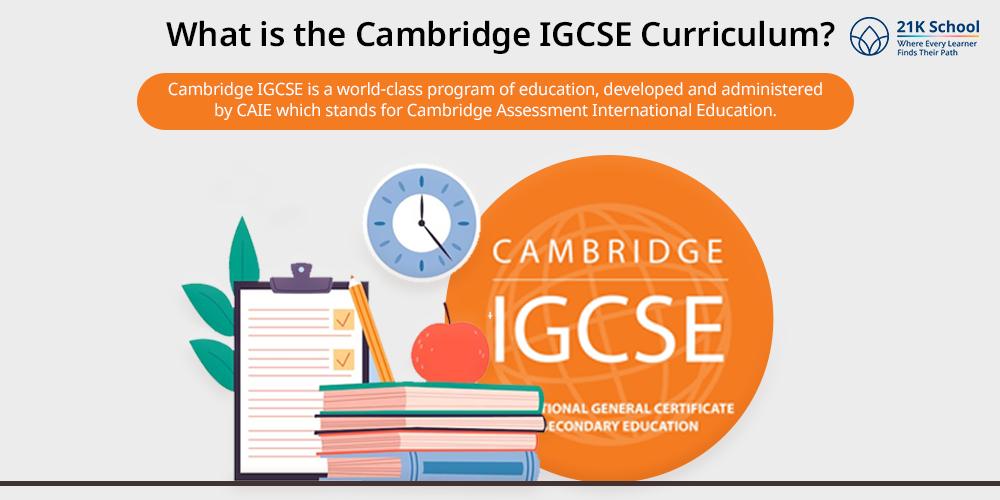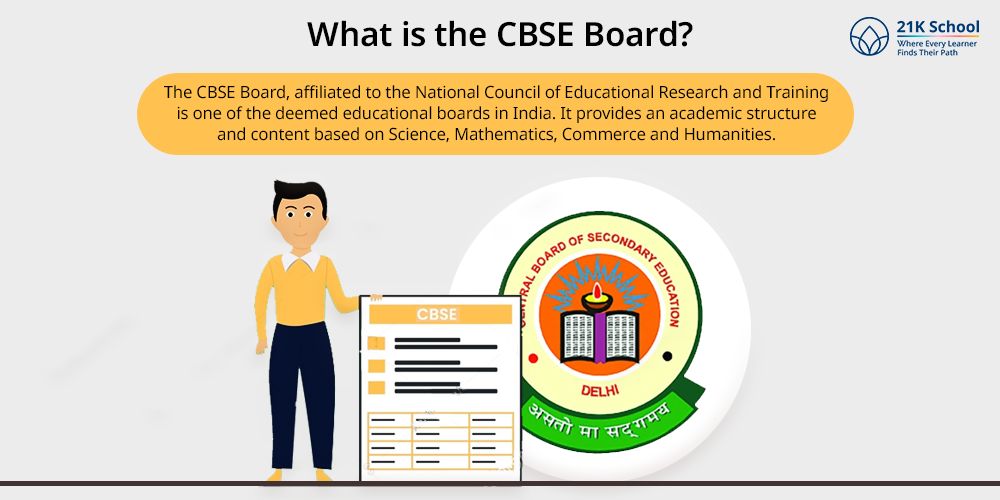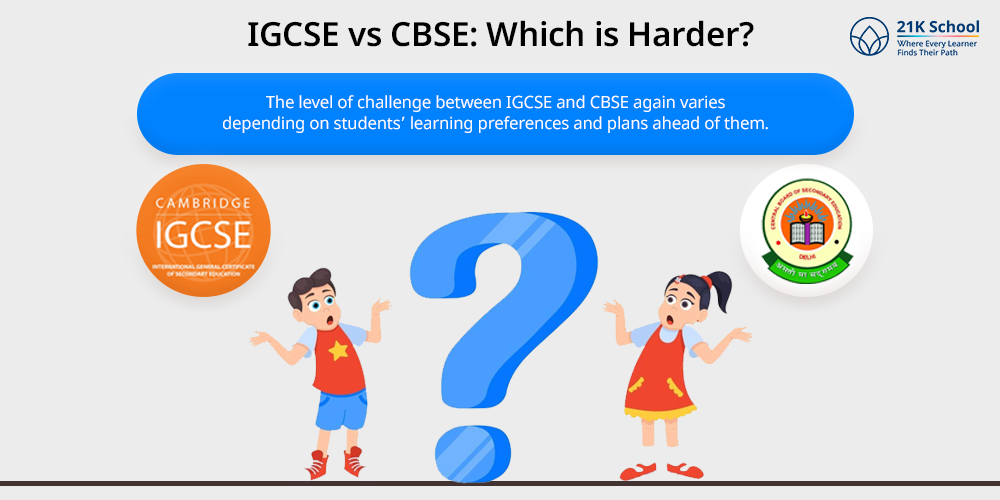
Choosing the right education board is one of the independence which parents and students can make, as this choice determines the future of a person’s studying process and career.
The two choices are the Cambridge IGCSE (International General Certificate of Secondary Education, and the CBSE or Central Board of Secondary Education both of which have different butch strengths and learning methods.
While the IGCSE has the concepts of international curriculum, practical approach, flexibility CBSE has formal and structured syllabus and aims at preparing students for the All Indian level board examinations.
Comparing the two boards is crucial if a parent wants to make the right decision when enlisting his child to join a certain school.
If you are thinking of choosing between IGCSE and CBSE, then this guide will provide comprehensive information about curriculum, teaching method, global acceptance and key benefits of both.
Table of Contents
What is the Cambridge IGCSE Curriculum?

Cambridge IGCSE is a world-class program of education, developed and administered by CAIE which stands for Cambridge Assessment International Education.
It is intended to be an extended and uncontemplated curriculum which stresses skills, creativity and the curriculum that are useful. It is basically about shifting conventional to innovative learning experience.
Law offers students the choice of over 70 subjects where students can combine subjects of their selection based on their personal interests and the careers they envision themselves in.
The curriculum integrates students and is primarily based on different inquiries along with knowledge-based and project, research and activities.
Almost all universities across the globe recognize it, and therefore a perfect program for those students with study abroad plans. Referring to Cambridge international curriculum.
What is the CBSE Board?

The CBSE Board, affiliated to the National Council of Educational Research and Training is one of the deemed educational boards in India. It provides an academic structure and content based on Science, Mathematics, Commerce and Humanities.
CBSE pattern of education is a traditional system of getting mugged up via extensive curriculum support.
It focuses on bookish knowledge and tries to build up students preparing for national level entrance examinations like JEE and NEET. Education at CBSE schools is provided in English as well as Hindi, which caters for the largest portion of the population.
Cambridge IGCSE vs CBSE Board
Let’s compare the IGCSE and CBSE boards based on various educational parameters:
| Parameter | IGCSE | CBSE |
| Curriculum | Flexible, skill-based, focuses on practical application. | Structured, syllabus-based, emphasises theoretical learning. |
| Affiliation | International, recognized by CAIE. | National, governed by NCERT. |
| Subjects Offered | Wide variety (70+), customizable combinations. | Limited, focused on core academic streams. |
| Assessment Method | Written, practical, and oral exams with grades (A* to G). | Written exams with percentage-based marks. |
| Focus of Education | Critical thinking, research skills, and practical learning. | Rote learning, theoretical knowledge, and exam preparation. |
| Language of Instruction | Primarily English. | English and Hindi. |
| Global Recognition | Highly recognized internationally. | Primarily recognized within India. |
| Teaching Methodology | Student-centric, inquiry-based learning. | Teacher-led, syllabus-focused teaching. |
| Cost of Education | Higher, offered by international schools. | Lower, with many government-aided schools. |
| Skill Development | Emphasis on analytical and problem-solving skills. | Emphasis on academic performance and exam readiness. |
| Examination Frequency | Twice a year (May/June, October/November). | Annually (March for board exams). |
| Learning Approach | Flexible, encourages projects and research. | Structured, focused on textbook learning. |
| Preferred for | Students aiming for international studies. | Students preparing for national entrance exams. |
IGCSE: Pros and Cons
Pros:
- It is a globally recognized and accepted curriculum by top universities, and colleges for higher studies.
- IGCSE includes a wide range of subject choices for learners to choose from.
- When it comes to studies this curriculum focuses on practical learning and skill development, contributing to the overall holistic development of the learner.
- The learning approach for this curriculum is flexible and tailored to student needs, encouraging a positive environment to facilitate academic and personal growth..
Cons:
- Apart from all the bright side to this learning approach, it has a higher cost of education compared to national boards and state boards .
- As it is set for global standards there are instances that it may not align well with the Indian competitive exam system, and learners might feel left out and lack all the resources required for acing the paper.
- It is very different from the conventional method of studying and thus, it has less focus on standardised testing and rote learning.
CBSE: Pros and Cons
Pros:
- CBSE being the standard curriculum for India, it is Widely recognized within India, especially for national entrance exams.
- It is a well Structured curriculum with a strong focus on core subjects, and providing optimum focus on skill development. .
- It caters to various needs of learners, by being available in English and Hindi, catering to a diverse demographic.
- Being so widely available in India it contributes to the Lower cost of education to the wide audience of the country, with many affordable school options.
Cons:
- CBSE, being available and affordable comes with limited flexibility in subject choices.
- It is very close to traditional or conventional methods of learning, it holds a significant emphasis on rote learning and standardised testing.
- It holds very little focus on practical skills and critical thinking, when it comes to overall education but is still widely acceptable throughout india.
IGCSE vs CBSE: Which is Harder?

The level of challenge between IGCSE and CBSE again varies depending on students’ learning preferences and plans ahead of them.
IGCSE may be seen as more difficult because of focus on analyses, research based projects, as well as offering a greater number of subjects.
It involves the student to learn practically and apply the obtained knowledge to solve real life problems.
However, what we have put in CBSE is that it is more organised and syllabus oriented involving more theoretical concepts and factual knowledge which would certainly suit the bookworms type of students.
Conclusion
It therefore impossible to say that either IGCSE or CBSE is better; it all hinges on the peculiarities of the child, his or her passions, and intended careers.
IGCSE is good for those learners who are interested in getting an international view, a wide selection of subjects, emphasis on effective skills and analytical thinking and suitable for those learners who want to continue with their studies in other countries.
However, the CBSE system of education is more appropriate for the learners who plan to succeed in the Indian competitive examinations since it provides a set syllabi which covers and develops student’s basic foundational education and theoretical competency in core academic subjects.
The selling advantage of both boards is that each has its peculiarities and choosing between them must rest on your child’s academic interests and career aspirations.
Essentially the key is to find a board which is right for them and one that complements their goals and objectives whilst offering them the right conditions for growth and success.
